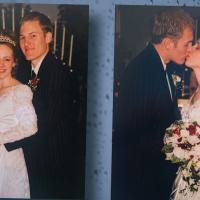Healing the Soldier and His Relationship
“I basically had a nervous breakdown, Mike Beaulieu said about the struggles he faced after life in the military. Cumulative effects from blast exposures on my brain and all that built up – I was horrible.”
“It was like he brought the war home,” Wendy Beaulieu said. “Jekyll and Hyde – I'm with the good one sometimes, and then the bad one’s here and you don’t know which one you’re going to end up with.”
From the battlefields of Iraq to Afghanistan, Mike served his country as a Forward Observer in the US Army for over a decade. He was good at his job, but the physical and mental toll it took on him was beginning to affect his wife, Wendy, and their children.
“You can do one of two things,” Mike said. “You can be a good dad and husband, or you can be a good soldier, you really can’t do both at the same time. So, I tried to focus on my job because I was the income earner, but my family sacrificed. That constant fear all the time gave me no break to decompress. I was really verbally abusive, like maybe a drill sergeant. But at the time, I didn't think I was doing anything wrong.”
“He started drinking excessively,” Wendy said. “More easily agitated, less patience with the kids. I tried to talk to him about it, but he did not want to burden me. Not knowing what he went through, I couldn't understand. He would fight hard for him being right about his thoughts, or his actions, or his behavior, it was like we were at war with each other. There's just not enough of the good and the love to feel even secure.”
Then, in 2010, Mike was retired from the Army. Thirteen blast exposures and severe PTSD had left him a shell of his former self.
“I felt like I went from a hero to an absolute zero,” Mike said. “I didn't have any of that support structure anymore, and I was no longer useful to the military. I felt like I was cast away, a used-up toy that they didn't want to play with anymore. Pain really wears on you and limits the amount of patience you have for other people. The whole scenario really negatively affected my relationship with my wife, and so that's when suicide came into it. I really looked at suicide as an option to stop hurting my family.”
“The first suicide attempt was, gut wrenching,” Wendy said. “I just never expected it. ‘I’ve got to be better at this. I've got to do better at making him happy. I've got to really work harder at being a really good wife.’ And we've got a brain injury that's causing all kinds of impulsive and unsafe behaviors. I couldn't share who I was with my husband for fear that any words I say may be deadly. So, I was telling God, and asking God, and begging God, just help me understand. Sometimes it was prayers of just...I need strength to get through this. I was getting hopeless.”
Wendy continued to suffer in silence until she learned about Operation Heal Our Patriots, a project of Samaritan’s Purse that invites military couples to a six-day marriage retreat in Alaska. There, they learn how to better communicate and apply Biblical principles to help strengthen their relationships. For the Beaulieus, it was a revelation.
“So, I'm in my camaraderie group again, able to talk out loud to other people about everything because they're going through the same thing,” Mike said. “Through their time and effort, they helped course correct me. It was the beginning of a change. I knew God and had a reverence for God, but I didn't have a relationship with Him. Now, it's like I'm talking to a family member, or friend, or an uncle. The more you focus on Christ, the less you focus on the hurt. It was a constant effort to bring Him into every decision that I made through prayer and time in the Bible learning what He had to teach me.”
“Once I let it out, when I expressed my emotions or my thoughts, then I think God showed me that I was just as valuable, my emotions and my thoughts were just as valuable to Him as my husband’s were, and I could start healing,” Wendy said. “And just that being able to trust God, I could be a wife again and not just a nurse. We can talk now. I didn’t have a voice before, but now I have a voice and he can hear me, and I don't have to worry about what I say is going to kill him.”
It took several years, but Mike and Wendy eventually learned how to put God first in their marriage. The results have restored their family.
“Today as a couple, we're thriving,” Wendy said. “We are best friends. We can go on vacations with our kids. I am overwhelmed with God and what He's done in our lives. I'm so grateful to have my husband with me to do life with me. I have a partner again. We are Key Leader Volunteers, so we work with other couples that have gone through Operation Heal Our Patriots. We hope that people can see our story and see that there is hope and that we can encourage them to do the things that we've learned to do, like pray.”
“My job was literally to control the battlespace, to control my environment,” Mike said. “You can't control everything. You have to surrender that control to Him. If it wasn't for Wendy, I would be dead. If it wasn't for Christ, I wouldn't have a wife and I'd be dead. Throughout that process of going hero to zero, He's made me feel like a hero again.”




